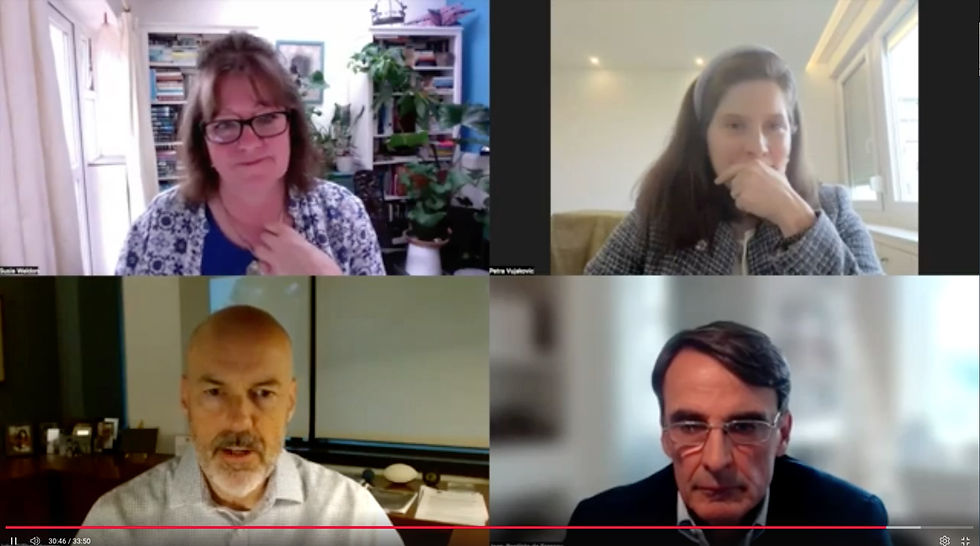Mensuram Bonam summit brings Catholic investors together
- FaithInvest

- Nov 27, 2024
- 4 min read
Updated: May 7, 2025
London was the venue for an extraordinary gathering of mostly Catholic investors for the second Mesuram Bonam faith-consistent investing summit (FCI), held on November 11-12.
The two-day summit brought together more than 90 people responsible for investing on behalf of the Catholic Church, Catholic religious orders and institutions from across the world, as well as asset managers and of other organisations. Representatives of FCI Collaboratorium partner organisations were also there, including FIIND Impact Foundation, FaithInvest and the Francesco Collaborative/ Catholic Impact Investing Collaborative.

Catholic investors struggle to find funds
Speaking before the event, Jean-Baptiste de Franssu, president of the Institute for the Works of Religion (known as the Vatican bank), which organised the summit, said Catholic institutions have hundreds of millions of dollars to invest – but almost no investment options if they want to ensure their funds are aligned with Catholic Social Teaching and reflect Catholic values.
He estimated that Christian organisations have an estimated $1.75 trillion to invest, but unlike Muslim investors, who can find dozens of Sharia-compliant funds listed on investment-tracking websites such as Morningstar, it is very hard to find funds that align with Catholic/Christian values.
A key focus of the Mensuram Bonam summit was to come up with practical recommendations on how to enable Catholic institutions to implement guidelines contained in the Pontifical Academy of Social Sciences' 2022 document Mensuram Bonam ('For Good Measure'), subtitled 'Faith-Based Measures for Catholic Investors: A Starting Point and Call to Action' (pictured right).
It was supported by the Netherlands-based Anthos Fund and Asset Management, and US-based firms CBIS Catholic Responsible Investments, Catholic Investment Services and Knights of Columbus Asset Advisors, and hosted by the UK’s largest charity fund manager, CCLA, a significant provider of investment management services to faith groups in the UK.
In the first Mensuram Bonam summit in Rome last year, which brought together representatives of Catholic institutions, De Franssu said it was clear that there had not been enough dialogue on these issues among those responsible for investing, and that too few of people within faith institutions really understood finance.
FCI guidelines research
One of the presentations at the meeting included the results of a research project looking at publicly available investment guidelines from Bishops' Conferences (groupings of Catholic bishops in a specific region) around the world.

It was able to point to only four 'full' guidelines and a few 'partial' guidelines – a clear indication of how FCI is still a relatively new concept for faith organisations, including Catholic institutions.
The full guidelines included:
Austrian Bishops' Conference
German Bishops' Conference
Italian Bishops' Conference
United States Bishops' Conference.
The partial guidelines included:
Belgian Bishops' Conference;
Catholic Bishops' Conference of England and Wales
Bishops' Conference of France
Irish Catholic Bishops' Conference;
Diocese of Christchurch (New Zealand)
Secretariat for the Economy of the Holy See (city state).
While the paper found many areas of consensus in the guidelines, they were also quite varied. For example, the Austrian Bishops' Conference guidelines were most emphatic about FCI as a hard requirement for all Church investors in Austria, whereas other guidelines give more discretion to investors, with words such as 'could' or 'might'.
However, the paper's authors concluded that 'this variety in opinions and approaches should be considered normal for these early stages of the Church's journey into FCI', adding: 'We should allow a lot of leeway for many voices in this dialogue between faith and finance. Progress towards greater FCI alignment should be an organic process that is driven by real world experience and by the search for what works well.'
Identifying Catholic/Christian funds
Supporting the criticism heard during the summit that Catholic/Christian investors cannot easily identify investment funds aligned with Catholic values came in a presentation made by investment research and ratings company Morningstar.
Although there is no category for Christian funds, Morningstar's Monika Calay said she had identified close to $80 billion in Christian assets in global funds, mostly in the US (nearly 70%) with the rest divided between the UK, Luxemburg and Ireland.
However, she admitted there were gaps in her research because she relied on key words such as 'Christian', 'Catholic' or 'Biblical' to identify funds. And some of the funds identified, such as those managed by CCLA, were not exclusively focused on Christian groups.
Conclusion
Going forward, participants called for greater collaboration on FCI between Catholic institutions; the development of a framework for practical implementation of FCI with Catholic values; and for the establishment of a category for Christian/Catholic funds to make it easier for faith-based investors to identify suitable investment opportunities. This was an inspiring, energising and forward-looking event that looks likely to turbocharge faith-consistent investing – not just for Catholic investors but for all faiths seeking to invest in line with their values.
Find out more about Mensuram Bonam by clicking the button below.



